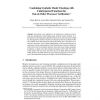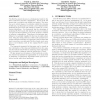119 search results - page 22 / 24 » A First-Order Isomorphism Theorem |
ML
2006
ACM
13 years 7 months ago
2006
ACM
The application of Inductive Logic Programming to scientific datasets has been highly successful. Such applications have led to breakthroughs in the domain of interest and have dri...
APAL
2002
13 years 7 months ago
2002
The paper introduces a semantics for the language of classical first order logic supplemented with the additional operators and . This semantics understands formulas as tasks. An ...
27
Voted
EUSFLAT
2009
13 years 5 months ago
2009
Abstract-- An L-fuzzy context is a triple consisting of a set of objects, a set of attributes and an L-fuzzy binary relation between them. An l-cut is a classical context over the ...
FMCAD
1998
Springer
13 years 11 months ago
1998
Springer
We present a new approach to the verification of hardware systems with data dependencies using temporal logic symbolic model checking. As a benchmark we take Tomasulo's algori...
GECCO
2008
Springer
13 years 8 months ago
2008
Springer
The No-Free-Lunch theorem is a fundamental result in the field of black-box function optimization. Recent work has shown that coevolution can exhibit free lunches. The question a...


